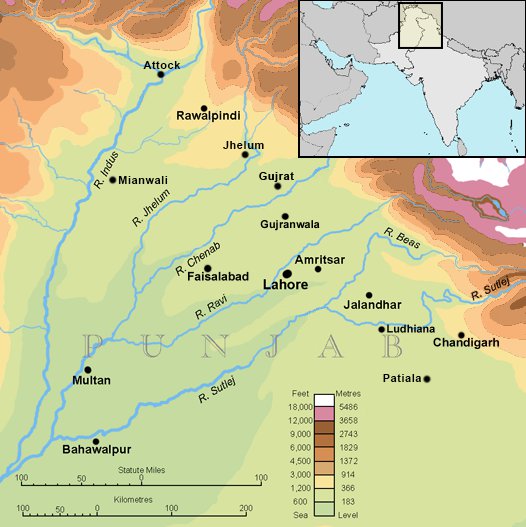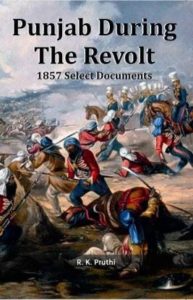Panjaab sovereignty stolen -British rulers wanton, shameless, unrepentant
Every new year supposedly brings hope. British columnist Jagdeesh Singh, begins 2022, with nagging anguish, pain and a strong opinion about the lasting and continued effects of the historic British conquest and subjugation of Panjaab. Even though the British establishment has seemingly gone, the last effects of what they have stripped away from Panjaab, continue to be felt both emotionally and materially, as Panjaab lingers on in the geopolitical world as a stateless people and a lost country. The Panjaabi nationalist author shares his profound thoughts and feelings, as an overseas Panjaabi sitting in the heart of the British mainland.
![Every new year supposedly brings hope. British columnist Jagdeesh Singh, begins 2022, with nagging anguish, pain and a strong opinion about the lasting and continued effects of the historic British conquest and subjugation of Panjaab. Even though the British establishment has seemingly gone, the last effects of what they have stripped away from Panjaab, continue to be felt both emotionally and materially, as Panjaab lingers on in the geopolitical world as a stateless people and a lost country. The Panjaabi nationalist […]](https://www.theworldsikhnews.com/wp-content/uploads/2022/01/division-of-panjaab-1947-360x266.jpg)
THE BRITISH IMPERIAL ESTABLISHMENT STOLE NOT ONLY the vast array of national icons and treasures of the independent, sovereign country of Panjaab; but so too the actual political sovereignty and the entire existence of this once powerful and vibrant South Asian independent country.
Invaded in 1845, as part of its ceaseless imperial expansion across South Asia; Panjaab was seized and subdued after the first gruelling Anglo-Panjaab war, generally known as the Anglo-Sikh war. Then, after a Panjaabi national uprising to oust the British occupiers, in 1848-1849, Panjaab was defeated again -not in the least due to the nefarious use of treacherous senior position holders in the Panjaab government like Gulab Dogra by the British. This was the second Anglo-Panjaab war.
Whilst we mark multiple other anniversaries, it is strange that we don’t mark these critical anniversaries in the Panjaab national life. The loss of our country, state and own sovereign governance: continues to detrimentally affect us today, on so many levels.

British policy-makers and strategists had concluded that for the progress of British power, it was essential to terminate and eliminate the vibrant, fearless, militarily powerful Panjaabi nation and state -with all its revolutionary substance and historic fire and power. Lord Dalhousie, the head of the invading British power -the British East India Company, wrote: “…it is indispensable to the security of British territories….that you should put an end to the independence of the Sikh nation and reduce it to entire subjection.”

The formal annexation of Panjaab in 1849 into the grand British India empire, was the end of Panjaabi-Sikh freedom, security and statehood. It was the major start of a process of slowly but surely crushing Panjaabi-Sikh identity, consciousness and civilisation. It was the start of an enduring 220-year-continuum of devastation and destruction – both, large-scale and piecemeal -of Panjaabi nationhood. Even the Amritsar Harimandir Sahib -‘Golden Temple’ was about to be sold at one point.
The Jalianwala Bagh massacre in 1919, within six months of the end of the First World War in which Panjaabi soldiers had fought and died for Britain to vitally and gallantly. In 1947, 2-million Panjaabis were massacred and 10-million disrupted from their centuries-old homes (largest displacement in human history). All were gifted to the powerless Panjaabi people, by the glorious British empire.
Today we clamour and strive to wrench ourselves free from the subsequent political carve-up, partition and manipulation that the British imperialists set in continuous motion, leading to the current-day multiple partition and decimation of Panjaab, its multiple genocidal phases -1947, 1984-1995 and comprehensive oppression by the current India and Pakistani states which have now replaced and taken up the reins of British rule to occupy and dominate the broken, encaged Panjaab.
I do not think any self-respecting Englishman will ever again be able to look a Sikh in the face or shake his hand in the way only honourable friends can understand.”
We are powerless to ask for the return of our artefacts, as they are sold in front of our eyes as privatised property in British royal collections and auctions. We are a voiceless, disempowered and unrecognised nation. We are a people without our country, our state, our army, our international voice amongst the governments of the world!! We have no position or recognition in the United Nations or the grand ‘international community of governments! What do we do? Where do we go? What will happen? 2022 and beyond? As broken, injured and devastated Panjaab rolls into another year of continuing muck and mire, many like me are at the end of their tethers, but the spirit of Chardikala prompts us to fight back and continue our mission for reclaiming our glory.
In 1946, as the further phases of Panjaab’s devastation approached in the form of the notoriously unequal, genocidal and undemocratic British Transfer of Power to the chosen India and Pakistan elites approached, profoundly concerned individuals like Colonel Landen Sarasfield spoke out passionately for Panjaab and the Sikhs as the avante-guard community which sought to advocate for the indigenous land of five rivers.
The Sikhs are the only great community whose demands have been rejected altogether…Wherever in the East, and very often in the West, a British soldier has been in action, there also were to be found his Sikh comrades, every loyal, ever courageous and ever ready to give their life’s blood in the Common Cause.
Colonel Landen Sarasfield in Betrayal of the Sikhs, published in Lahore in 1946, poignantly wrote, “Throughout the centuries many efforts have been made to crush the Sikhs, and destroy them as a political and religious force….The Sikhs are the only great community whose demands have been rejected altogether…Wherever in the East, and very often in the West, a British soldier has been in action, there also were to be found his Sikh comrades, every loyal, ever courageous and ever ready to give their life’s blood in the Common Cause. From those days in 1857 when nearly all India rose against us and massacred as many Europeans as were defenceless, the Sikhs have always been on our side. Whether at Dheli or on the plains of Flanders, in Salonika or in the Islands of the Pacific, they have covered themselves with immortality in our service. Surely, therefore, we cannot be so ungrateful as to forget them, to forget the services which saved so many British men and women in the past, to forget that without them in 1857 there would have been no recapture of Dheli, nothing but sheer stark disaster to British arms and consequent violation and death to so many British women and girls. If we do forget and permit the Sikhs to be consigned to economic and political oblivion, I do not think any self-respecting Englishman will ever again be able to look a Sikh in the face or shake his hand in the way only honourable friends can understand.”
May the glorious, rich and empowered Panjaabi nation, rise again!
